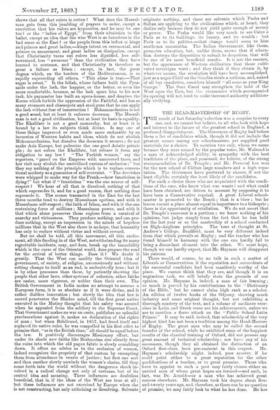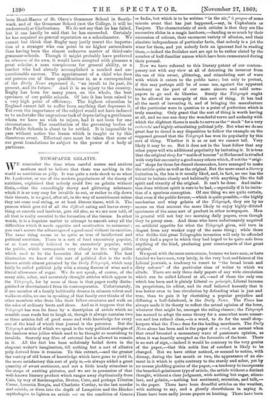THE HEAD-MASTERSHIP OF RUGBY.
THE result of last Saturday's election was a surprise to every one, and, we cannot but believe, to all who look with hope and interest to the future of the greatest school in England, a
profound disappointment. The Governors of Rugby had before them a list of candidates which, though it did not include the greatest names among our schoolmasters, yet supplied good materials for a choice. To mention two only, whom we name because they were named by the popular voice, Mr. Walrond is a man of acknowledged ability, in sympathy with the best traditions of the place, and possessed, we believe, of the strong recommendation of Dr. Temple ; and Mr. Perceval has won for the new school of Clifton large numbers and a high repu- tation. The Governors have preferred to choose, if not the least eligible, certainly the least likely of the candidates.
For such a choice those who are acquainted with the condi- tions of the case, who know what was wante 1 and what could have been obtained, are driven to account by supposing it to have been a Conservative reprisal. A great Liberal school- master is promoted to the Bench ; that is a blow ; but he leaves vacant a place almost equal in importance to a bishopric ; there is the opportunity of retaliation. We do not assert that Dr. Temple's successor is a partizan ; we know nothing of his opinions, but judge simply from the fact that he has held for the last year or so the mastership of a school conducted on High-Anglican principles. The tone of thought at St. Andrew's College, Bradfield, must be very different indeed from that which prevails at Rugby ; and the teacher who has found himself in harmony with the one can hardly fail to bring a discordant element into the other. We must hope, though we can hardly expect, that Mr. Hayman will disappoint his patrons.
There would, of course, be no talk in such a matter of Liberals or Conservatives, if the reputation and antecedents of the successful candidate had been manifestly worthy of the place. We cannot think that they are, and though it is an ungracious task, we will briefly state the grounds of our opinion. Mr. Hayman is, indeed, a man of fair learning ; so much is proved by his contributions to the "Dictionary of the Bible," but he cannot claim high rank as a scholar.
An edition of twelve books of the Odyssey, showing much
industry and some original thought, but not exhibiting a thorough mastery of the text, and a volume of mediocre exer-
cises in Latin and Greek verse are his achievements, unless we are to mention a fierce attack on the "Public School Latin Primer." It may be said, indeed, that scholarship of the very highest kind has not been a tradition among the Head-Masters of Rugby. The great man who may be called the second founder of the school, while he exhibited some of the happiest results of the classical training of Oxford, did not possess any great amount of technical scholarship ; nor have any of his successors, though they all obtained the distinction of an Oxford first-class, been pre-eminent in this respect. Mr. Hayman's scholarship might, indeed, pass muster, if he could point either to a great reputation for the other qualifications of a teacher, or to great promise. Those who have to appoint to such a post may fairly choose either an untried man of whom great hopes are formed—and such, in
fact, was Dr. Arnold—or a man who has achieved great success elsewhere. Mr. Hayman took his degree about five- and-twenty years ago, and, therefore, as there can be no question of promise, we may fairly look to what he has done. He has been Head-Master of St. Olave's Grammar School in South- wark, and of the Grammar School (not the College, it will be understood) at Cheltenham. We do not say that he has failed, but it can hardly be said that he has succeeded. Certainly he has acquired no general reputation as a schoolmaster. We cannot but think that Rugby may justly resent the importa- tion of a stranger who can point to no higher antecedents than having been the almost unknown master of third-rate grammar-schools. Though it might probably have preferred an alumnus of its own, it would have accepted with pleasure a great scholar, a man conspicuous for general ability, or a teacher who had already accomplished a marked and un- questionable success. The appointment of a chief who does not possess one of these qualifications is, as a correspondent of the Daily News expressed it, "an insult to its past, its present, .and its future." And it is an injury to the country. Rugby has been for many years, on the whole, the beet specimen of our public schools. Of late it has been raised to a very high point of efficiency. The highest education in England cannot fail to suffer from anything that depresses it. Yet even the importance of the subject would not have induced UB to undertake the ungracious task of depreciating a gentleman whom we have no wish to injure, had it not been for one circumstance. The constitution of the governing bodies of the Public Schools is about to be settled. It is impossible to pass without notice the lesson which is taught us by this disastrous event. Effectual care must be taken that none of our great foundations be subject to the power of a body of partizans.



































 Previous page
Previous page